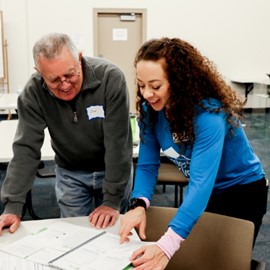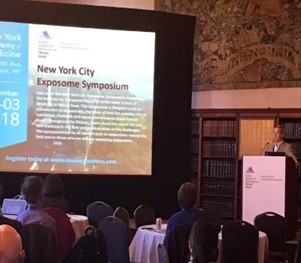Science Leadership
Superfund Research Program (SRP) staff and grantees are committed to advancing SRP research by presenting innovative findings, tools, and technologies to stakeholders in academia, government, and local communities.
-

Ramirez-Andreotta, right, has headed several collaborative research projects that create science learning opportunities and engage community members in data collection, interpretation, and translation of results into action. -
University of Arizona SRP Center researcher Monica Ramirez-Andreotta, Ph.D., assistant professor in the Department of Soil, Water, and Environmental Science at the University of Arizona (UA), received the 2019 Early Career Award for Public Engagement with Science presented by the American Association for the Advancement of Science (AAAS). Ramirez-Andreotta, who studies soil and food quality, was recognized for involving communities most affected by pollution, poor water quality, and food insecurity in the scientific process.
-
UC San Diego SRP Center researcher Ronald Evans, Ph.D., was named a 2018 AAAS Fellow . The AAAS acknowledged his discoveries on steroid and orphan receptor signaling, revealing a "treasure trove" of both known and novel branches of physiology, metabolism, and disease, according to the citation.
-
SRP Health Scientist Administrator Michelle Heacock, Ph.D., led a session at the NIEHS Partnerships for Environmental Public Health's Annual Meeting, highlighting three SRP projects that have been reporting back individual results. Reporting research results back to study participants helps to ensure that individuals and communities that are part of a research study have access to their data and information on what it means for their health.
-
SRP Health Scientist Administrator Heather Henry, Ph.D., has been serving as a mentor for the Triangle Global Health Consortium's Mentorship Program . The program provides opportunities for mentees to gain knowledge and skills in advancing global health, establish new connections, and discover opportunities for internships and employment.
-
SRP-funded research related to per- and polyfluoroalkyl substances (PFAS) was highlighted at the November 7 Federal Remediation Technologies Roundtable meeting in Reston, Virginia. The goal of the meeting was to identify and discuss current technologies and the emerging science behind PFAS characterization and cleanup. Henry participated in a panel discussion about the research gaps and next steps for characterizing and cleaning up PFAS and discussed the wide-ranging efforts of SRP-funded researchers related to PFAS.
-

Robert Wright, M.D., a professor and chair of environmental medicine and public health at the Icahn School of Medicine at Mount Sinai, gave introductory and closing remarks during the New York City Exposome Symposium. Wright previously worked with the Harvard University SRP Center for 20 years, where he progressed from a trainee to overall center director. -
Current and former SRP researchers described their work and learned from others as part of the New York City Exposome Symposium , held November 2 - 3. The symposium delved into innovative approaches in exposomics, the study of how the complex mix of nutritional, chemical, and social environments shapes human health throughout the lifespan.
-
SRP Health Specialist Brittany Trottier, M.P.H., presented at the Society of Toxicology (SOT) Annual Meeting, in the session titled "E-Waste: An Evolving Global Public Health Concern and Risk Assessment Challenge." Trottier provided an overview of e-waste recycling practices in different regions across the globe and highlighted activities and approaches that have been used to tackle this growing problem. Heacock co-chaired the session.
-
SRP Health Scientist Administrator Danielle Carlin, Ph.D., also presented at the SOT Annual Meeting during the workshop session titled "Applying Systems Biology Approaches to Understand the Joint Action of Chemical and Nonchemical Stressors." She discussed using atherosclerosis as a model disease to determine the interaction of chemical and non-chemical stressors.
-
On November 28, SRP-funded small business Microvi Biotech, Inc. announced that its technology was selected to treat nitrate-contaminated groundwater in the Cucamonga Valley Water District of Rancho Cucamonga, California. The new nitrate treatment facility has the potential to restore to the community more than two billion gallons of previously contaminated groundwater per year.
to Top



